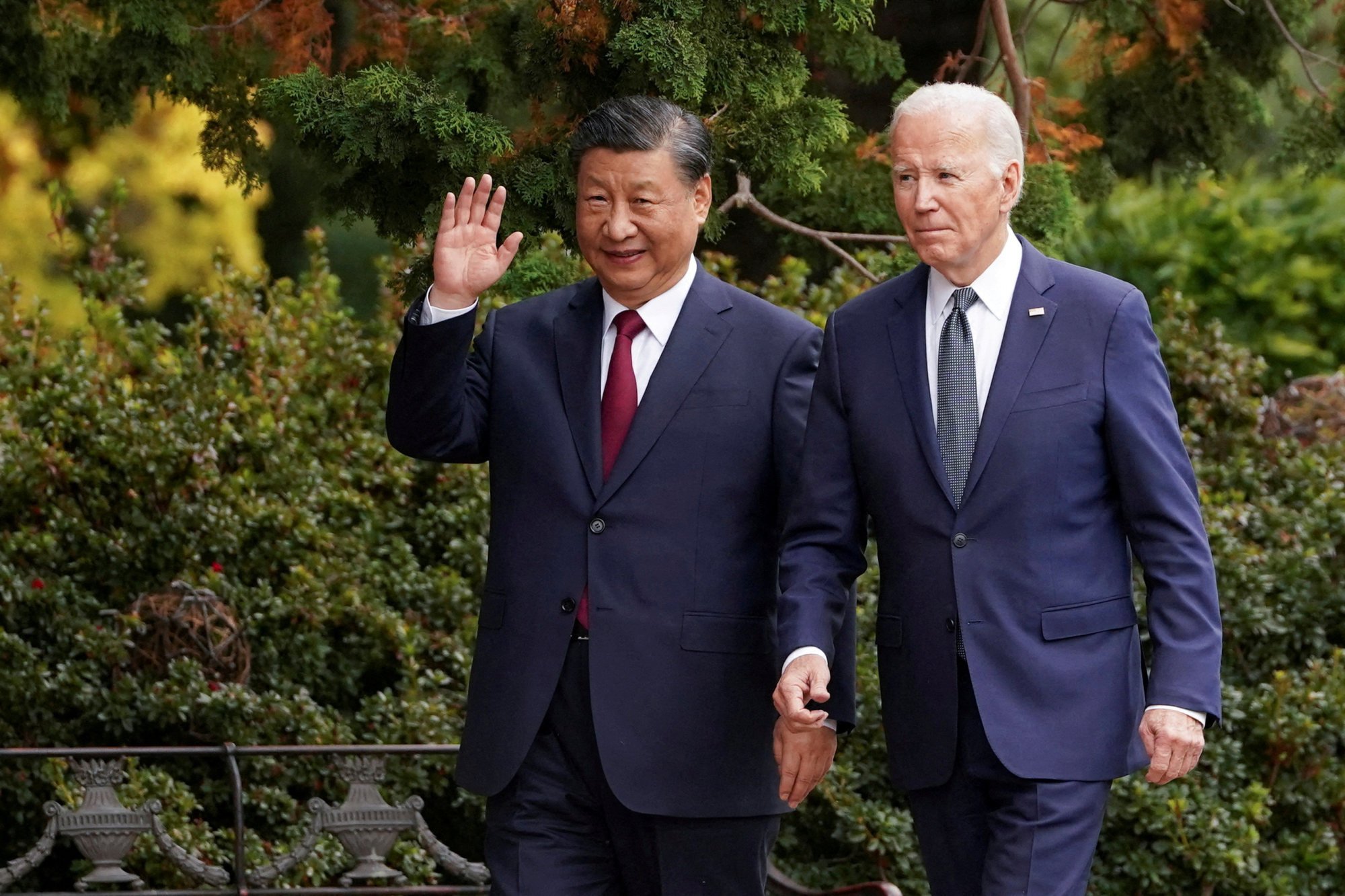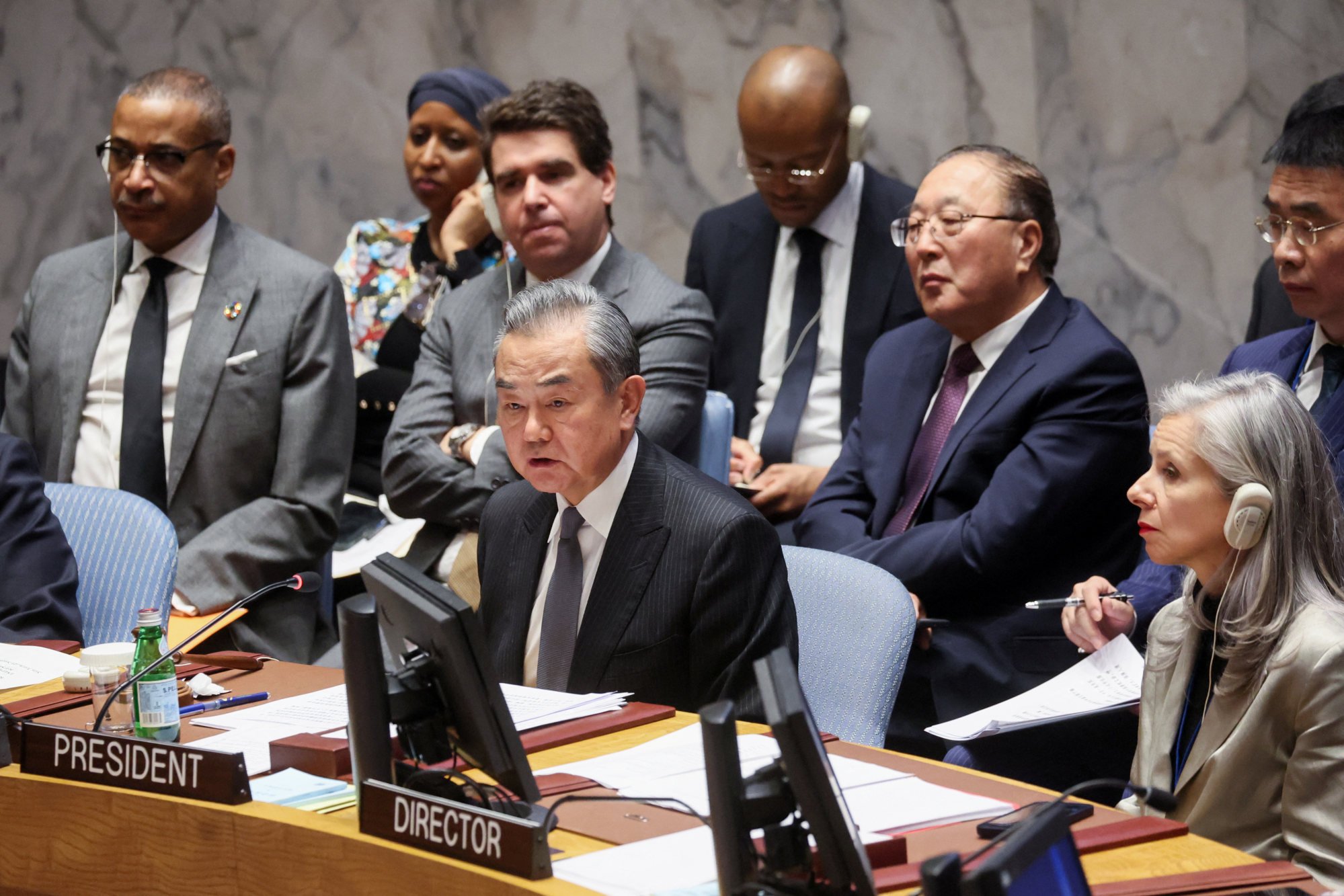Chinese Foreign Minister Wang Yi warned the UN Security Council on Wednesday that a resumption of fighting between Israel and Palestinians threatens to “devour the whole region” as he called for a comprehensive and lasting ceasefire in Gaza.
China wraps up its rotating one-month presidency of the 15-member Security Council on Thursday that has been consumed by the emergency. Beijing’s growing focus on global diplomacy and outreach to Mideast countries was evidenced by its decision to dispatch one of its most senior diplomats from Beijing to chair a high-level session on the crisis.
China held the presidency during November and Ecuador takes over in December.
Do you have questions about the biggest topics and trends from around the world? Get the answers with SCMP Knowledge, our new platform of curated content with explainers, FAQs, analyses and infographics brought to you by our award-winning team.
UN Secretary-General Antonio Guterres said on Wednesday that the Gaza Strip was in the midst of an epic humanitarian catastrophe and urged the world not to turn away.
“Intense negotiations are taking place to prolong the truce – which we strongly welcome – but we believe we need a true humanitarian ceasefire,” he told the meeting.
A six-day truce between Israel and Hamas was scheduled to expire early on Thursday. The fighting was ignited when Hamas attacked southern Israel on October 7, killing around 1,200 people and taking some 240 hostages, according to Israel.
The attack prompted an aggressive Israeli military counteroffensive in the Gaza Strip that has included air strikes, a siege and ground assault against Hamas, which governs the densely populated Gaza Strip and is listed as a terrorist organisation by Washington. At least 14,000 Gaza residents have been killed in Israeli strikes, according to the Gaza Health Ministry, along with over 100 UN workers.
As of Wednesday morning, 60 Israeli hostages and 180 Palestinian prisoners had been released with more set to be freed later in the day. Israel has agreed to extend the ceasefire by one day for every 10 hostages released.

Qatar, which has played a key role mediating the conflict, said negotiators were working for a “sustainable” ceasefire.
China has walked a fine line with its Middle East policy, calling for a ceasefire, free flowing humanitarian aid and moves to prevent the Israel-Palestinian conflict from spreading. But it has also balked at calls – including those by US President Joe Biden during his meeting with President Xi Jinping this month in San Francisco – to use its influence with Iran and Syria to ensure that the crisis does not expand more broadly.
Wang told reporters after the meeting that Xi has spoken with state leaders other than Biden, including with Iranian President Ebrahim Raisi during the August Brics grouping of developing countries, and that China sees things differently.
“The consensus reached at that summit is to call for a comprehensive ceasefire to ensure unhindered humanitarian access and a return to the two-state solution,” Wang said. “And it is along that direction China will continue to play a constructive role.”
Xi Jinping and Iranian president vow to strengthen multilateral alliances
Many countries including the US have called for a separate state for Palestinians – and China has issued a position paper and called for an international peace conference to help build a consensus – but it has long proven elusive.
“Only when the two-state solution is fully implemented can the Middle East enjoy genuine peace and Israel enjoy lasting security,” said Wang. “It must be prioritised, not marginalised, on the international agenda.”
Wang said that China has sent humanitarian aid to Gaza, without disclosing how much, but that it was stopped at the border. He said another shipment was on its way that would hopefully be delivered “as quickly as possible”. Separately, the US said it delivered 54,000 pounds of aid to Egypt on Tuesday for Gaza residents.
In recent years, Beijing has tried to take a higher profile in global diplomacy, offering periodically to negotiate between Moscow and Kyiv in the wake of Russia’s invasion of Ukraine. And in March, it mediated a rapprochement between Iran and Saudi Arabia.

China has strengthened its outreach in the Mideast as well as in Africa and Asia in response to Washington’s “allies and partners” strategy to counter Beijing’s contested sovereign claims in the South China Sea and expanding regional and global footprint.
“The Chinese want regional stability, especially in the Gulf, where ironically the US Navy protects Saudi oil exports to Beijing,” said Aaron David Miller, a senior fellow with the Carnegie Endowment for International Peace.
“At the same time, they’ve been expanding their political role in the region, hoping to exploit Washington’s close identification with Israel to pick up points with the Arabs, Palestinians and Global South.”
Wang has called for effective implementation of Resolution 2712 – the council’s first resolution for a Gaza ceasefire on humanitarian grounds, adopted on November 15 – as the first step in promoting a ceasefire and as a good start to resolving the Palestinian-Israeli conflict through political means.
China to play peacekeeper in post-war Gaza, but US holds key to truce: analysts
Most members on the council – comprised of permanent members China, the US, Russia, France and the United Kingdom as well as 10 revolving members – called on Wednesday for an immediate ceasefire, humanitarian relief and meaningful adoption of the resolution.
But Russian UN Ambassador Vasily Nebenzya criticised the resolution as “toothless” and “watered down” by Washington, citing “US-provoked divisions” and the “blatant double standards” of global suffering, comparing a video of Ukrainian officials dancing to Palestinian hardship.
China and Russia, having announced a “no-limits” partnership days before Moscow’s February 2022 invasion of Ukraine, have joined forces in countering US “unipolar hegemony” and promoting the benefits of authoritarian governance. Beijing, however, has stopped short of openly supplying weapons to Moscow, wary of a backlash from its customers in Europe and North America.
In a related move, Wang met on Tuesday in New York with Malaysian Foreign Minister Zambry Abdul Kadir, according to Xinhua, and said Beijing was ready to elevate its bilateral comprehensive strategic partnership and deepen exchanges. The two nations are set to launch a mutual visa-free entry arrangement, with Zambry expressing hope that more Chinese tourists will visit Malaysia.
More from South China Morning Post:
- ‘China’s position is clear’: Foreign Minister Wang Yi pushes for one UN voice on Gaza ceasefire
- ‘Halt the fighting’: China and Arab nations renew call for ceasefire in Gaza
For the latest news from the South China Morning Post download our mobile app. Copyright 2023.





